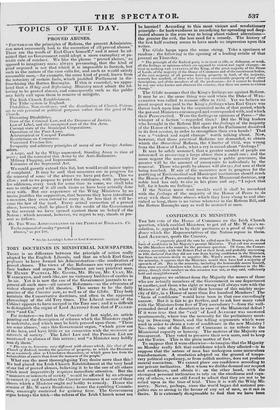TORY DOCTRINES IN MINISTERIAL NEWSPAPERS.
THERE is no difference between the principle of action really adopted by the English Liberals, and that on which Earl GREY professes to have formed his Administration—the eradication of proved abuses. The views of the Reformers are very practical ;
their leaders and organs in Parliament are very practical men.
Sir HENRY PARNELL, Mr. GROTE, MT. HUME, Mr. CLAY, Mr. WARBURTON, and such like, are no visionary builders of castles in ..he air. Yet it is now the cue of the Government journals to re- present all such men—all earnest Reformers—as the advocates of violent change and wild theories. This seems to be the daily practice of the Courier now, as well as of the Globe. They both maintain the Conservative doctrines, and often in the approved phraseology of the old Tory times. The Liberal section of the Cabinet appears to have merged in the Tory one; and it is difficult to distinguish the organ of Lord ALTHORP from that of PALMER- STON "and Co."
For instance—we find in the Courier of last night, an article pointing out the description of reforms which the Ministers ought to undertake, and which may be fairly pressed upon them. "There are some abuses," says this Government organ, "which grow out of the laws, and have little or no connexion with the manners or interests of society." The Libel Law and the Pension List are mentioned as.abuses of this nature; and "a Minister may boldly rem dy them."
" The ease is, however, very different with abuses which, like that of the Church (y. Ireland, involve the question of property, to which the Dissenters are as sensitively alive as Churchmen themselves, or which grow less from the technicalities of courts than from the manners ofthe people."
;What can the most thoroughgoing Tory desire more than this? Ile had placed the Irish Church Establishment at the very head of our list of proved abuses, believing it to be the one of all others Which most imperatively requires immediate attention. But the "manners or interests of society" would be affected by an attempt to correct it; and therefore the Courier instances it as one of those abuses which a Minister ought not boldly to remedy. Hence the evasion a Mr. WARD'S Resolution ; hence the rambling Commis- sum, cunningly contrived for gaining time. The Government organ betrays the trick—the reform of the Irish Church must not
be hurried! According to this most vicious and revolutionary principle— for backwardness in remedying far-spreading and deep- rooted abuses is the sure way to bring about violent alterations— the greater the evil, the less need for a remedy. The history of the last half century seems to have made no impression upon this writer.
The Globe harps upon the same string. Take a specimen at random : the following is the opening of a leading article of that journal on Thursday.
" The principle of the Radical party is to treat as idle, or dishonest, or weak, all the feelings or opinions which are opposed to violent and rapid changes—to treat as nothing THE FEELINGS of the King, of the great majority of the House of Lords, of the majority of the House of Commons and of the constituent bodies, of the vast majority of all persons having property in land, of the majority, scarcely less marked, of those who have any considerable property of any other description, and of the members of all the professions—for it cannot be doubted by any one who knows and observes the country, that these are averse to violent change."
The Globe assumes that the King's feelings are against Reform. It may be so: the same thing was said when the Duke of WEL- LINGTON was called to resume office in 1832. Yet we believe no great respect was paid to the King's feeling,s when Earl GREY was thrust back upon him by the organized mobs of that period, which the present Ministers encouraged and corresponded with, and which their Press excited. Were the feelings or opinions of Peers—" the whisper of a faction "—regarded then ? Did the Whig leaders who brought in the Reform Bill spare thefeelings of the majority of the house of Commons, when they got the Parliament dissolved in its first session, in order to strengthen their own bands? That was a "violent and rapid change" worth talking about. Now. however, that those practical Reforms are demanded, to obtain which the theoretical Reform, the Charter of 1832, was wrung from the house of Lords, what a cry is raised about "feelings!"
It may be safely assumeg, that a greater number of people are interested in preserving a large abuse than a small one ; and the more urgent the necessity for removing a public grievance, the greater will be the amount of annoyance to individuals by the removal. Those who profit by abuses will alwaysfee/ sore at their being touched. If any of the measures now in progress for the puriqing of Ecclesiastical and Municipal institutions should reach the House of Peers, according to the new Ministerial doctrine, any noble lord has only to rise in his place and say, "I reject that bill, for it hurts my feelings."
If the Nation must wait meekly until it shall he accordant with the feelings of the majority of the House of Peers to do away with those State abuses which they have clung to and che- rished so long, there is no virtue whatever in the Reform Bill, and the Rotten Boroughs may as well be restored at once.






















 Previous page
Previous page